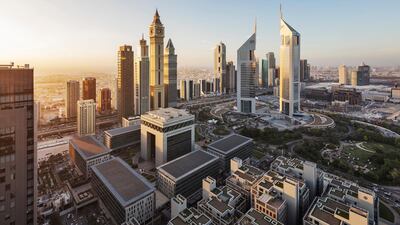Ambitious economic transformation agendas are driving the diversification and development of economies across the Middle East, creating millions of new jobs and new consumers with new wealth to invest and spend.
The United Arab Emirates is at the forefront of this shift. And it is so by design.
This $350 billion economy is the product of the careful calibration of vision, focus, planning, investment and execution.
The result is the Middle East’s most diversified economy, powered by a “smart” development agenda.
The UAE has a digitally-driven government pushing the private sector to keep the country 10 years ahead of the competition.
We have tech-savvy citizens with the world’s deepest smartphone penetration at more than 90 per cent.
And it’s not just our people who are smart – so is our infrastructure.
The UAE’s project pipeline between now and 2022 is worth $1.3 trillion.
Rethinking the energy value chain and investing to deliver smart growth, maximize value and increase profitability will create in Ruwais the world’s single biggest integrated refining and petrochemicals destination by 2025.
Alongside this, the UAE has established itself as the capital of green energy expertise and home to the International Renewable Energy Association, the world’s driving force for global energy transformation.
The long-term renewables project pipeline in Dubai alone is worth $27bn and the Mohammed bin Rashid Al Maktoum Solar Park is one of the world’s biggest.
That puts the UAE at the centre of a flow of new ideas about the way in which the world will be powered in the future.
And it is flow that is absolutely vital to trade. The flows of goods, of capital, of people.
People are already flocking here in record numbers.
__________
Read more:
Reform of UAE’s ownership and residency laws will only improve growth prospects
UAE rises in competitiveness ranking to 7 out of 63 countries, IMD says
New residency laws to boost UAE’s owner-occupier market
__________
The 15 million visitors who arrived in Dubai in 2017 made it the 6th most visited city in the world – ahead of New York and Paris.
At least 25 million people are expected to visit in 2020 for the World Expo.
And that’s crucial, because Expo is the global meeting point of people and ideas – a festival of human ingenuity.
That ingenuity is already in action in the work being done to build the world’s biggest aviation hub.
When it’s finished, Dubai will be able to accommodate 240 million passengers every year.
Meanwhile the appeal of the UAE as a destination for long term investors has never been stronger.
The country has attracted an average $10bn of FDI each year so far this decade and was a top 10 destination for global FDI in 2017.
And don’t forget that those investors connect and combine with the wealth that’s already here.
The UAE is home to $1.3tn of sovereign wealth fund assets.
And its population of ultra high net worth Individuals, with investible assets of more than $30 million, is set to expand by 60 per cent in the 10 years to 2026.
This is a financial market and international investment hub that has been built around a geography that connects businesses on three continents.
The UAE is a crucial gateway for two-way trade worth $570bn with Asia, Europe, Africa and the Rest of the World.
It houses the world’s busiest port outside of Asia, handling 15 million containers every year, operated by a company with a ports portfolio extending to 70 terminals on six continents.
The recent HSBC Navigator, a comprehensive report of global trade and business confidence across 25 markets globally, shows that 77 per cent of UAE businesses responding to the survey expect trade volumes to grow over the coming 12 months, with 62 per cent expecting a jump in services trade
But what makes it more promising still is that the UAE is a key connection point for China’s Belt & Road Initiative.
The Trade Navigator report forecasts China to be a top three import and export partner for companies in the UAE between now and 2030.
There are more than 4,000 Chinese businesses here – from large state owned enterprises (SOE)s, to small and medium sized enterprises (SMEs) – and Dubai’s Dragon Mart is the world’s largest hub for trading Chinese products outside of mainland China.
And the investment flows from China through the UAE to the rest of the world are accelerating.
In other words, a new global trade order is emerging, driven by Asia and the Middle East.
As the gateway to growth in the Middle East and beyond, the UAE is immersed in the potential of the flow of capital, people and ideas from around the world.
It’s a rising tide of potential. It is our wave to ride.
Abdulfattah Sharaf is chief executive officer of HSBC UAE

